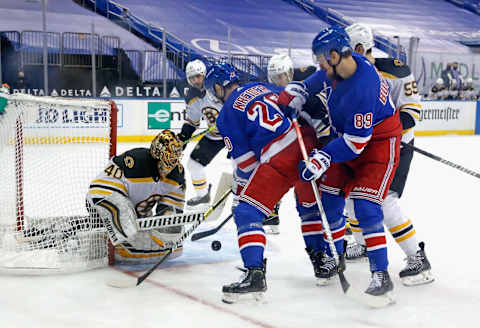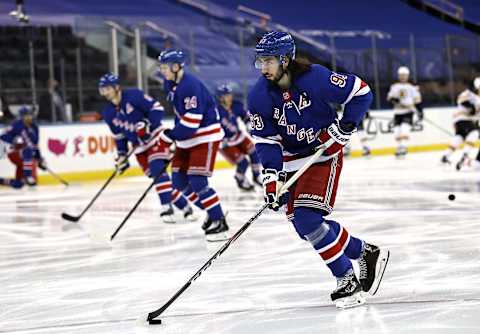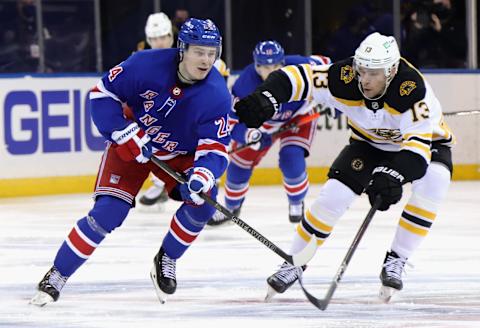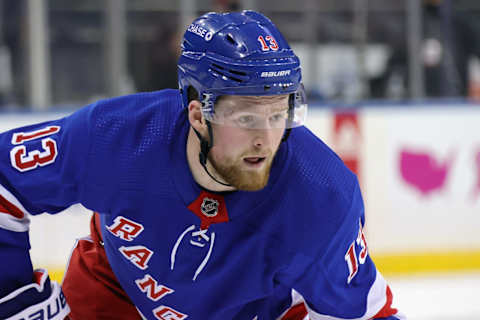New York Rangers: Time off to work on issues


The New York Rangers are looking at a break in the schedule that could last a week. Their game on Sunday against the Flyers was postponed and right now, their game on Tuesday against the Devils is iffy. As of Saturday, 18 Devils players are unable to play or practice due to the NHL’s COVID protocols. If they are still out by Monday, the game won’t happen.
Thursday, the Rangers are supposed to play the Flyers who currently have seven players out due to the COVID protocols. That game is in jeopardy.
If you don’t believe that, the NHL has asked the Rangers if they would be available to replace the Flyers in Sunday’s Honda NHL Outdoors Sunday game against the Bruins. The Rangers organization has indicated that they would be willing. What that would mean for their two-game series in Washington scheduled for next weekend remains to be seen. It is kind of a mess.
Seeing multiple reports that the Rangers could be the backup team for the Lake Tahoe game. Reported yesterday that NHL has backup plans in case any of the four teams can't go. Obviously some concern about the Flyers at this point. https://t.co/bzAMy3cQGd
— Greg Wyshynski (@wyshynski) February 11, 2021
Practice time
The fact is, with all of these postponements, it means that the schedule in April and May will be crammed full of makeup games. The NHL is on a tight time frame if they want to conclude the Stanley Cup Playoffs before the Tokyo Olympics start on July 23. No matter how you look at it, it is a schedule maker’s nightmare.
What it does mean is that the Rangers have a lot of time to work on the issues that have made this a challenging season for them.
The Rangers unveiled new forward lines in practice on Saturday.
#NYR practice lines:
— Vince Z. Mercogliano (@vzmercogliano) February 13, 2021
Kreider - Mika - Blackwell
Laf - Strome - Kakko
PDG - Howden - Buch
Lemieux - Rooney - Gauthier
The big change is moving Pavel Buchnevich down to the third line and replacing him with Colin Blackwell. After practice Coach David Quinn acknowledged that Buchnevich had been “struggling lately” and making the move could help him. Since scoring two goals in the second game of the season, he has only one open net goal in 11 games to go with five assists. One saving grace for his season has been his work ethic and his contributions on the penalty kill to go along with his eight points.
That’s not to say that his linemates Mika Zibanejad and Chris Kreider are on fire. Zibanejadhas not scored since the third game of the season and has only two assists. That’s three points on the season while averaging 20:46 minutes of playing time.
Meanwhile, Kreider has four goals in 12 games and has yet to get an assist and is scoreless in his last four games. He is playing an average of 17:41 minutes per game, the most average ice time in his career.
Quinn talked about the slumps facing his top players. “Unfortunately, we have a bunch of guys going through it at the same time.. Right now collectively we have it happening…it’s not from a lack of effort, these guys have a proven track record..they’re gonna get out of it….we don’t have much more time for them to get out of it.”

The power play
Everyone is well aware of how bad the Rangers’ power play is this season. Quinn said that the power play was the reason that the game against Boston turned around in the second period, saying the “early power play in the second period, we just lost our mojo. It demoralized us while their two power plays gave them more life. ”
More from Editorials
- Rangers’ Playoff Redemption Recipe: Grit and Fresh Hopes
- Rangers’ Roster Chatter: Who’s Making the Cut and Who’s in the Penalty Box?
- These Rangers must learn Peter Laviolette’s ropes before they can fly
- Filip Chytil Could Take Major Steps in the 2023-24 Season
- Looking forward to the upcoming season for Artemi Panarin
It’s true, the Rangers got the man advantage just 2:12 into the second period and the inept power play actually slowed the team down with the Bruins outshooting the Blueshirts. That was followed by two Ranger penalties within the next six minutes and even though they killed the penalties, the Bruins controlled play and had eight scoring opportunities. Quinn said the Rangers’ poor second period was “the direct result of the power plays more than anything.”
According the Vince Mercogliano of USA Today, they did change up the power play units at practice. The first unit was Adam Fox, Mika Zibanejad, Kaapo Kakko, Ryan Strome and Chris Kreider. The second unit was Jacob Trouba, Alexis Lafrenière, Pavel Buchneich, Colin Blackwell and Brendan Lemieux.
Of course, all of the lines and power play units will change if Artemi Panarin is healthy enough to play on Tuesday (if they play). Quinn said that they are “hopeful” that he will be ready to play.
One of the questions is why, with the power play record at two for its last 29, Quinn has not shaken up the top unit. In the new configuration, Kakko replaces the injured Panarin, but the rest of the unit is intact. The second unit is changed, but they have been getting practically no power play time since the first unit remains on the ice well into the second minute.
Encouragingly, Zibanejad has been getting more and more opportunities and appears to be ready to break out, but Kreider has been virtually invisible. At this point, with one of the worst power plays in the league, it may be time for wholesale changes.
In the last game the Strome-Kakko-Lafrenière line had some good looks and one wonders why not keep a unit that is clicking together with the man advantage.

The kids
Quinn was very animated when talking about Lafrenière and Kakko. He made a point of explaining that despite their high draft status, they joined a team with some excellent forwards and no one should expect for them to get the same amount of ice team a top pick would get on an inferior team.
Quinn said “These guys didn’t join teams that finished dead last in the league. We got very lucky in both situations…Laffy joins a team with some pretty good forwards, he’s not stepping into a situation where we went 10-72 last year.” Quinn continued, “Everybody expects the number one and number two picks to play 20 minutes. We have two players that are going to be great players in this league join a roster where there are some pretty good forwards. That kind of skews everything a bit for those guys.”
We took a look to see how accurate that is. Here are the seven top two forward picks since 2013, not including generational players like Auston Matthews, Jack Eichel or Connor McDavid. We included Kakko’s record this season.
TOI PP TOI Team, points
Lafrenière (2020 #1) 7g, 0a 14:28 2:08 Rangers 69 points (prorated)
Kakko (2019 #2) 10g 13a 14:17 2:14 Rangers 92 points
Svechnikov (2018 #2) 20g 17a 14:39 1:55 Hurricanes 99 points
Hischier (2017 #1) 20g, 32a 16:19 2:03 Devils 97 points
Patrick (2017 #2) 13g17a 13:43 1:50 Flyers 98 points
Laine (2016 #2) 36g, 28a 17:55 2:44 Jets 87 points
Reinhart (2014 #2) 23g, 19a 16:50 2:56 Sabres 81 points
MacKinnon (2013 #1) 24g 39a 17:21 2:20 Avalanche 112 points
Barkov (2013 #2) 8g, 16a 17:06 2:40 Panthers 66 points
Kakko (this season) 13g, 6a 14:38 1:34 Rangers 69 points
So, all seven of the first or second picks outscored Kakko in his rookie year and are on pace to even in this his second season. Lafreniere is off to a very slow start and his prorated numbers have to improve, but he will be hard pressed outdo the other picks.
None of the top picks played over 20 minutes a game with Patrik Laine topping out at 17:55. Three of the picks played fewer power play minutes and four played more.
Finally, four of the teams these players joined finished with better records that the Rangers prorated point total last season Three had worse records.
If the Rangers finish the way they are going this season, they will earn 69 points in an 82 game season. That would be a worse record than every team except the 2013 Florida Panthers.

What does it mean?
What’s the point of all of these comparisons? First, what Quinn said is absolutely true. There are some “pretty good forwards” on the Rangers and that has affected the ice time for Kakko and Lafrenière.
The situation is the those pretty good forwards are having pretty bad seasons. Except for Panarin, they are all playing badly. And that means it may be time for the kids to get some playing time that is consistent and important.
The issue is deployment. Most of the rookies got more power play time and Kakko’s time with the man advantage has dropped in his second season. With nothing going right offensively, is it the time for Quinn to throw the kids into the pool and see if they can swim? With Panarin out, it could be the perfect opportunity.
There are mitigating factors that stand in the way of Quinn allocating ice time differently. Chris Kreider’s $6.5 million salary has bought him a leash that is longer than he has deserved. With Zibanejad’s contract expiring after next season, they need to figure out if he is worth a long term commitment. They are committed to Panarin and he has not done anything to warrant a reduction in ice time.
It’s easy to heap the blame on David Quinn for misusing his young talent,but we don’t know where the pressures are coming from when it comes to those mitigating factors. The fact is that both Lafrenière and Kakko ave bounced all over the lineup and their playing time has varied wildly from game to game. If that is strictly the coach’s call, then its up to Quinn to figure out how to best use these young players.
The odd thing is he has done exactly that with his young defense. Teaming up Adam Fox and Ryan Lindgren and giving them so much ice time and then following that by heaping heavy minutes on K’Andre Miller is precisely what he hasn’t done with his young forwards. It’s working for his blueliners, why not try it with Lafrenière and Kakko?
Related Story. Report card #2: Progress of the rebuild. light